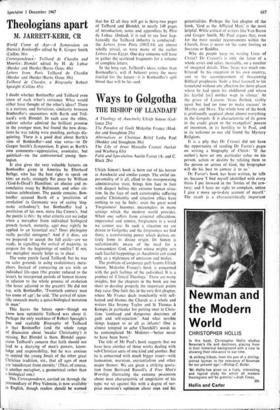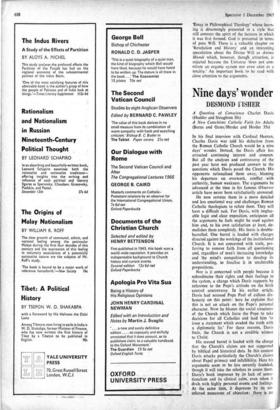Ways to Golgotha
THE BISHOP OF LLANDAFF A Theology of Auschwitz Ulrich Simon (Gol- lancz 25s) The Paradox of Guilt Malcolm France (Hod- der and Stoughton 25s) Alternatives to Christian Belief Leslie Paul (Hodder and Stoughton 30s) The Life of Jesus Marcello Craveri (Seeker and Warburg 63s) Faith and Speculation Austin Farrer (A. and C. Black 28s) Ulrich Simon's book is born out of his horror at Auschwitz and similar camps. The awful im- personality of it all, allied to the overpowering administrative state, brings him face to face with despair before this extreme human situa- tion. In the face of such catastrophic suffering secular Christianity and situation ethics have nothing to say he feels: even the great word 'Forgiveness' becomes meaningless in many settings which the modern world provides. When one suffers from criminal officialdom, impersonal and remote, forgiveness is a word we cannot use: In such a situation we are driven to Golgotha and the forgiveness we find there, a transforming power which derives en- tirely from its divine origin. Dr Simon is unfashionably aware of the need for a transcendent God, without whose mighty acts such fearful happenings as Auschwitz can stand only as a nightmare of unreason and malice.
The problem of corporate guilt haunts Ulrich Simon; Malcolm France's book is concerned with the guilt feelings of the individual. It is a product of 'Clinical Theology.' There are many insights, but the chapters in the book are too short to develop properly the important points they raise. One feels this id the very first chapter, where Mr France deals trenchantly with self- hatred and blames the Church as a whole and writers like Jeremy Taylor and St Thomas a Kempis in particular for putting over to Chris- tians 'confused and dangerous doctrines of guilt and self-rejection.' And what terrible things happen to us all as infants! One is almost tempted to echo Churchill's words as he contemplated Mr Molotov—`better never to have been born.'
The title of Mr Paul's book suggests that we have here another of those works dealing with sub-Christian sects of one kind and another. But he is concerned with much bigger issues—with humanism, marxism, existentialism and other major themes. We are given a striking quota- tion from Bertrand Russell's A Free Man's Worship illustrating the extreme pessimism about man characteristic of empiricists of his type; we set against this with a degree of sur- prise marxism's optimism about man and his potentialities. Perhaps the last chapter of the book, 'God as the Afflicted Man,' is the most helpful. While critical of writers like Van Buren and Gregor Smith, Mr Paul argues that, even for the most secular reassessments within the Church, Jesus is never on the same footing as Socrates or Buddha.
Why do people keep on writing Lives of Christ? Dr Craveri's is only the latest of a whole series and relies, inevitably, on a number of imagined details. Thus 'Jesus was much em- bittered' by his reception in his own country, and to the accompaniment of threatening Biblical prophecies 'bade a final farewell to his homeland without any affection for those places where he had spent his childhood and where his fearful [sic] mother wept in silence.' At the grave of Lazarus 'Jesus flushed, visibly upset but had no time to make excuses' to Martha and Mary. The whole tone of the book is profoundly sceptical about almost everything in the Gospels. It is characteristic of its genre in the credit given to the evangelists' powers of invention, in its hostility to St Paul, and in its welcome to our old friend the Mystery Religions.
It is a pity that Dr Craved did not have the opportunity of reading Dr Farrer's pages on writing a biography of Christ: 'If the author's hero set any particular value on his person, action or destiny by relating them to- the person or action of God, the biographer will do his best to convey it to us.'
Dr Farrer's book has been written, he tells us, because 'I find myself identified with every thesis I put forward in the 'forties of the cen tury; and I have no right to complain, unless I give a more up-to-date account of myself.' The result is a characteristically important
`Essay in Philosophical Theology' whose learn- ing is disarmingly presented in a style that still conveys the spirit of the lectures in which it was first formed. God is presented in terms of pure Will. There is a valuable chapter on 'Revelation and History' and an interesting speculation about the Divine Will as Anima Mundi which, however, though attractive, is rejected because the Universe 'does not con- stitute an organic system nor even exist as a totality.' An important book to be read with close attention to the arguments.



































 Previous page
Previous page